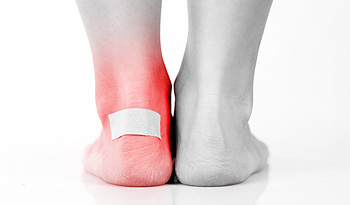Blogs
How Exactly Do Blisters Form?
When friction from a shoe or sock rubbing against your skin causes the epidermis (top) layer and dermis (underlying) layer of skin to move in opposite directions, the skin becomes irritated, red, and inflamed. Continued friction will cause the epidermis and dermis to separate and fill with fluid or blood, and a blister is formed. Pain from a blister is caused when nerves are stimulated by the fluid. You can help stop blisters from occurring by wearing shoes that fit properly and don’t allow your feet to slip around or rub against them. New shoes or boots should be worn in properly and gradually—before wearing them all day. If you are planning a long walk or hike, you can try taping areas on the foot that are prone to blisters such as the back of the heel, the big toe and the little toe. A podiatrist can show you how to tape your feet properly and also create custom orthotics designed specifically to keep your feet from developing blisters. They can even suggest appropriate footwear for walking and running.
Blisters are prone to making everyday activities extremely uncomfortable. If your feet are hurting, contact Dr. Dean D. Hinners of Illinois. Our doctor can provide the care you need to keep you pain-free and on your feet.
Foot Blisters
Foot blisters develop as a result of constantly wearing tight or ill-fitting footwear. This happens due to the constant rubbing from the shoe, which can often lead to pain.
What Are Foot Blisters?
A foot blister is a small fluid-filled pocket that forms on the upper-most layer of the skin. Blisters are filled with clear fluid and can lead to blood drainage or pus if the area becomes infected.
How Do Blisters Form?
Blisters on the feet are often the result of constant friction of skin and material, usually by shoe rubbing. Walking in sandals, boots, or shoes that don’t fit properly for long periods of time can result in a blister. Having consistent foot moisture and humidity can easily lead to blister formation.
Prevention & Treatment
It is important to properly care for the affected area in order to prevent infection and ease the pain. Do not lance the blister and use a Band-Aid to provide pain relief. Also, be sure to keep your feet dry and wear proper fitting shoes. If you see blood or pus in a blister, seek assistance from a podiatrist.
If you have any questions, please feel free to contact one of our offices located in Metropolis and Eldorado, IL . We offer the newest diagnostic and treatment technologies for all your foot care needs.
Read more about Blisters on the FeetHow Common Is Peripheral Artery Disease?
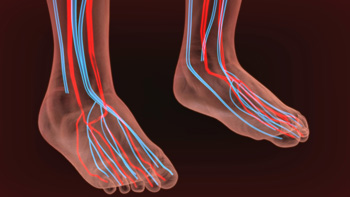 Peripheral artery disease (PAD) is a condition in which the arteries that supply blood to your limbs become narrow and hardened due to a buildup of plaque along the artery walls, leading to poor circulation. This condition is unfortunately quite common, affecting up to 200 million people worldwide. Often, people are not even aware that they have PAD because it does not always produce noticeable symptoms. When symptoms are apparent, they may include pain, cramping, tightness, or fatigue in the lower limbs. These symptoms often become worse with exercise or physical exertion. More advanced PAD can cause pain in the legs even without physical activity, as well as numbness, coldness, and discoloration of the lower limbs. In some cases, wounds that heal poorly may appear on the feet and legs. If you are experiencing any of the symptoms of PAD, or if you are older and at risk of developing this condition, please seek the care of a podiatrist.
Peripheral artery disease (PAD) is a condition in which the arteries that supply blood to your limbs become narrow and hardened due to a buildup of plaque along the artery walls, leading to poor circulation. This condition is unfortunately quite common, affecting up to 200 million people worldwide. Often, people are not even aware that they have PAD because it does not always produce noticeable symptoms. When symptoms are apparent, they may include pain, cramping, tightness, or fatigue in the lower limbs. These symptoms often become worse with exercise or physical exertion. More advanced PAD can cause pain in the legs even without physical activity, as well as numbness, coldness, and discoloration of the lower limbs. In some cases, wounds that heal poorly may appear on the feet and legs. If you are experiencing any of the symptoms of PAD, or if you are older and at risk of developing this condition, please seek the care of a podiatrist.
Peripheral artery disease can pose a serious risk to your health. It can increase the risk of stroke and heart attack. If you have symptoms of peripheral artery disease, consult with Dr. Dean D. Hinners from Illinois. Our doctor will assess your condition and provide you with quality foot and ankle treatment.
Peripheral artery disease (PAD) is when arteries are constricted due to plaque (fatty deposits) build-up. This results in less blood flow to the legs and other extremities. The main cause of PAD is atherosclerosis, in which plaque builds up in the arteries.
Symptoms
Symptoms of PAD include:
- Claudication (leg pain from walking)
- Numbness in legs
- Decrease in growth of leg hair and toenails
- Paleness of the skin
- Erectile dysfunction
- Sores and wounds on legs and feet that won’t heal
- Coldness in one leg
It is important to note that a majority of individuals never show any symptoms of PAD.
Diagnosis
While PAD occurs in the legs and arteries, Podiatrists can diagnose PAD. Podiatrists utilize a test called an ankle-brachial index (ABI). An ABI test compares blood pressure in your arm to you ankle to see if any abnormality occurs. Ultrasound and imaging devices may also be used.
Treatment
Fortunately, lifestyle changes such as maintaining a healthy diet, exercising, managing cholesterol and blood sugar levels, and quitting smoking, can all treat PAD. Medications that prevent clots from occurring can be prescribed. Finally, in some cases, surgery may be recommended.
If you have any questions, please feel free to contact one of our offices located in Metropolis and Eldorado, IL . We offer the newest diagnostic and treatment technologies for all your foot care needs.
Read more about Peripheral Artery DiseaseWhat Shoes Should I Wear If I Work on My Feet?
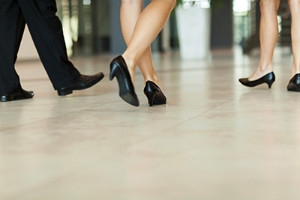 When working in a standing position all day, it is extremely important to wear the right shoes. Look for shoes that do not change the shape of your foot. These shoes should have a wide toe box that lets you move your toes and should fit your foot properly. Shoes with laces that can be adjusted for a firmer or looser fit are suggested. You should also look for shoes that have arch support to cushion your feet and reduce strain. When it comes to heels, choose shoes that have a firm grip on the heel to prevent instability and soreness. The shoes should not be completely flat, as this can strain the Achilles tendon. However, thin heels or heels higher than approximately two inches are not suggested. Instead, look for shoes that have a low heel with a broad base. For more information about appropriate footwear, please consult with a podiatrist.
When working in a standing position all day, it is extremely important to wear the right shoes. Look for shoes that do not change the shape of your foot. These shoes should have a wide toe box that lets you move your toes and should fit your foot properly. Shoes with laces that can be adjusted for a firmer or looser fit are suggested. You should also look for shoes that have arch support to cushion your feet and reduce strain. When it comes to heels, choose shoes that have a firm grip on the heel to prevent instability and soreness. The shoes should not be completely flat, as this can strain the Achilles tendon. However, thin heels or heels higher than approximately two inches are not suggested. Instead, look for shoes that have a low heel with a broad base. For more information about appropriate footwear, please consult with a podiatrist.
While working on the feet, it is important to take the proper care of them. For more information about working on your feet, contact Dr. Dean D. Hinners from Illinois. Our doctor will treat your foot and ankle needs.
Working on Your Feet
Standing on your feet for long periods of time can cause stress and pain in your feet. Your whole body may experience change in terms of posture, back pain, bunions, callouses and or plantar warts. There are ways to avoid these conditions with proper foot care, smart choices and correct posture.
Positive Changes
Negative heeled shoe – Choosing this shoe type places the heel slightly lower than the ball of the foot. These are great for overall foot health. Find shoes that fit you correctly.
Go barefoot – Our feet were not designed to be enclosed for all hours of the day. Try to periodically expose your feet to air.
Eliminate Pain
Foot Exercises – Performing simple exercises, incorporating yoga and doing stretches are beneficial. This will allow increased blood flow to the area and muscles of the foot.
Achilles tendon – Stretching the foot out flat on the floor will relax the calf muscles and tendon. These exercises can be performed almost anywhere. Make sure you add these exercises to your daily regimen.
With a little bit of this information and knowing more about foot health, you will notice changes. Foot stretches and proper footwear will help with pain and prevent further issues.
If you have any questions please feel free to contact one of our offices located in Metropolis and Eldorado, IL . We offer the newest diagnostic and treatment technologies for all your foot and ankle needs.
Read more about Working on Your FeetHeel Pain Can Be Treated!
What Is Pitting Edema?
Pitting edema refers to a visible swelling of a specific area caused by fluid buildup in the tissues. When pressure is applied to the area, it leaves a pit in the skin. While pitting edema can occur throughout the body, the feet and ankles are often affected. Beyond swelling and pitting, this condition can also cause tingling or burning sensations, pain, stiffness, numbness, and cramps. There are many potential causes for pitting edema, including poor circulation, obesity, pregnancy, dehydration, and injuries. Treatment will depend on the underlying cause of the condition, but may involve elevating the feet, wearing compression socks, or taking certain medications. If you notice swelling in your feet or ankles, please consult with a podiatrist.
Poor circulation is a serious condition and needs immediate medical attention. If you have any concerns with poor circulation in your feet contact Dr. Dean D. Hinners of Illinois. Our doctor will treat your foot and ankle needs.
Poor Circulation in the Feet
Poor blood circulation in the feet and legs is can be caused by peripheral artery disease (PAD), which is the result of a buildup of plaque in the arteries.
Plaque buildup or atherosclerosis results from excess calcium and cholesterol in the bloodstream. This can restrict the amount of blood which can flow through the arteries. Poor blood circulation in the feet and legs are sometimes caused by inflammation in the blood vessels, known as vasculitis.
Causes
Lack of oxygen and oxygen from poor blood circulation restricts muscle growth and development. It can also cause:
- Muscle pain, stiffness, or weakness
- Numbness or cramping in the legs
- Skin discoloration
- Slower nail & hair growth
- Erectile dysfunction
Those who have diabetes or smoke are at greatest risk for poor circulation, as are those who are over 50. If you have poor circulation in the feet and legs it may be caused by PAD and is important to make changes to your lifestyle in order to reduce risk of getting a heart attack or stroke. Exercise and maintaining a healthy lifestyle will dramatically improve conditions.
As always, see a podiatrist as he or she will assist in finding a regimen that suits you. A podiatrist can also prescribe you any needed medication.
If you have any questions please feel free to contact one of our offices located in Metropolis and Eldorado, IL . We offer the newest diagnostic and treatment technologies for all your foot and ankle needs.
Read more about Causes Symptoms and Treatment for Poor Circulation in the FeetThe Function of the Cuboid Bone
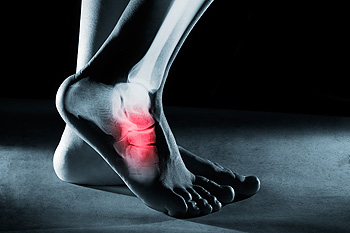 One of the first symptoms of the foot condition that is known as cuboid syndrome is pain and discomfort on the outside of the foot. Additionally, it may become difficult to walk, and the gait may become compromised. The cuboid bone resembles a pulley between specific tendons and the metatarsals. Cuboid syndrome is an inflammation of the cuboid bone, and can develop from a sudden injury, or abnormal foot structure. The symptoms may gradually be felt following an ankle sprain, or from repetitive overuse. Some patients have found mild relief when specific stretches are performed that may help to strengthen the affected part of the foot. If you have cuboid syndrome, please confer with a podiatrist as quickly as possible who can determine what the correct treatment is for you.
One of the first symptoms of the foot condition that is known as cuboid syndrome is pain and discomfort on the outside of the foot. Additionally, it may become difficult to walk, and the gait may become compromised. The cuboid bone resembles a pulley between specific tendons and the metatarsals. Cuboid syndrome is an inflammation of the cuboid bone, and can develop from a sudden injury, or abnormal foot structure. The symptoms may gradually be felt following an ankle sprain, or from repetitive overuse. Some patients have found mild relief when specific stretches are performed that may help to strengthen the affected part of the foot. If you have cuboid syndrome, please confer with a podiatrist as quickly as possible who can determine what the correct treatment is for you.
Cuboid syndrome, also known as cuboid subluxation, occurs when the joints and ligaments near the cuboid bone in the foot become torn. If you have cuboid syndrome, consult with Dr. Dean D. Hinners from Illinois. Our doctor will assess your condition and provide you with quality foot and ankle treatment.
Cuboid syndrome is a common cause of lateral foot pain, which is pain on the outside of the foot. The condition may happen suddenly due to an ankle sprain, or it may develop slowly overtime from repetitive tension through the bone and surrounding structures.
Causes
The most common causes of cuboid syndrome include:
- Injury – The most common cause of this ailment is an ankle sprain.
- Repetitive Strain – Tension placed through the peroneus longus muscle from repetitive activities such as jumping and running may cause excessive traction on the bone causing it to sublux.
- Altered Foot Biomechanics – Most people suffering from cuboid subluxation have flat feet.
Symptoms
A common symptom of cuboid syndrome is pain along the outside of the foot which can be felt in the ankle and toes. This pain may create walking difficulties and may cause those with the condition to walk with a limp.
Diagnosis
Diagnosis of cuboid syndrome is often difficult, and it is often misdiagnosed. X-rays, MRIs and CT scans often fail to properly show the cuboid subluxation. Although there isn’t a specific test used to diagnose cuboid syndrome, your podiatrist will usually check if pain is felt while pressing firmly on the cuboid bone of your foot.
Treatment
Just as the range of causes varies widely, so do treatments. Some more common treatments are ice therapy, rest, exercise, taping, and orthotics.
If you have any questions, please feel free to contact one of our offices located in Metropolis and Eldorado, IL . We offer the newest diagnostic and treatment technologies for all your foot care needs.
Read more about Cuboid Syndrome
Four Tips for Healthy Feet
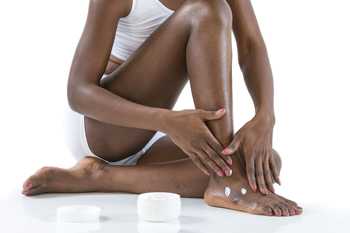 Your feet carry you throughout your life, supporting the weight of your body. Maintaining the health of your feet is essential and there are many simple ways to keep the feet healthy. Check your feet regularly for any abnormalities, such as cracks, cuts, scrapes, sores, or discoloration. If caught early, most foot problems can be promptly and effectively treated by a podiatrist. Visually checking your feet is especially important if you have medical conditions like diabetes, poor circulation, or peripheral neuropathy, as you may not feel or notice an injury until it has progressed significantly. Keep your feet clean by washing them with soap and water and drying them thoroughly, especially in the area between the toes. Wear shoes that fit comfortably and trim your toenails regularly. For more information about everyday foot care, please speak with a podiatrist.
Your feet carry you throughout your life, supporting the weight of your body. Maintaining the health of your feet is essential and there are many simple ways to keep the feet healthy. Check your feet regularly for any abnormalities, such as cracks, cuts, scrapes, sores, or discoloration. If caught early, most foot problems can be promptly and effectively treated by a podiatrist. Visually checking your feet is especially important if you have medical conditions like diabetes, poor circulation, or peripheral neuropathy, as you may not feel or notice an injury until it has progressed significantly. Keep your feet clean by washing them with soap and water and drying them thoroughly, especially in the area between the toes. Wear shoes that fit comfortably and trim your toenails regularly. For more information about everyday foot care, please speak with a podiatrist.
Everyday foot care is very important to prevent infection and other foot ailments. If you need your feet checked, contact Dr. Dean D. Hinners from Illinois. Our doctor can provide the care you need to keep you pain-free and on your feet.
Everyday Foot Care
Often, people take care of their bodies, face and hair more so than they do for their feet. But the feet are a very important aspect of our bodies, and one that we should pay more attention to. Without our feet, we would not be able to perform most daily tasks.
It is best to check your feet regularly to make sure there are no new bruises or cuts that you may not have noticed before. For dry feet, moisturizer can easily be a remedy and can be applied as often as necessary to the affected areas. Wearing shoes that fit well can also help you maintain good foot health, as well as making it easier to walk and do daily activities without the stress or pain of ill-fitting shoes, high heels, or even flip flops. Wearing clean socks with closed shoes is important to ensure that sweat and bacteria do not accumulate within the shoe. Clean socks help to prevent Athlete’s foot, fungi problems, bad odors, and can absorb sweat.
If you have any questions please feel free to contact one of our offices located in Metropolis and Eldorado, IL . We offer the newest diagnostic and treatment technologies for all your foot and ankle needs.
Read more about Everyday Foot CareWhy Are Flip-Flops Bad for Your Feet?
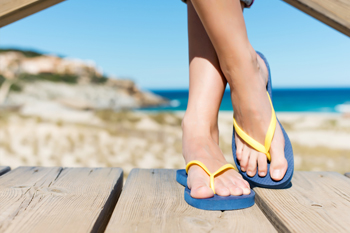 As the spring and summer months begin and bring warm weather with them, you may feel tempted to wear a pair of flip-flops. While these shoes are easy to slip on, they also make it easier to slip, leading to potential foot and ankle injuries. Furthermore, wearing flip-flops often can make you alter your gait or walking pattern. When you wear flip-flops, you tend to point your ankles inwards and curl your toes to keep the shoes on your feet. This unnatural walking pattern can lead to all sorts of foot problems, from hammertoes to heel spurs. Flip-flops also offer no arch support, which can lead to arch pain and plantar fasciitis. When the weather is warm, opt instead for sandals with heel straps, which will keep your foot in place. For more information about avoiding foot and ankle problems caused by footwear, please consult with a podiatrist.
As the spring and summer months begin and bring warm weather with them, you may feel tempted to wear a pair of flip-flops. While these shoes are easy to slip on, they also make it easier to slip, leading to potential foot and ankle injuries. Furthermore, wearing flip-flops often can make you alter your gait or walking pattern. When you wear flip-flops, you tend to point your ankles inwards and curl your toes to keep the shoes on your feet. This unnatural walking pattern can lead to all sorts of foot problems, from hammertoes to heel spurs. Flip-flops also offer no arch support, which can lead to arch pain and plantar fasciitis. When the weather is warm, opt instead for sandals with heel straps, which will keep your foot in place. For more information about avoiding foot and ankle problems caused by footwear, please consult with a podiatrist.
Flip-flops are not always the best choice of footwear. If you have any concerns about your feet or ankles, contact Dr. Dean D. Hinners from Illinois. Our doctor will assist you with all of your foot and ankle needs.
Flip-Flops and Feet
When the weather starts warming up, people enjoy wearing flip-flops. Flip-flops are comfortable, stylish, and easy to slip on and off; they're perfect for any summer beach goer. However, these shoes can cause harm to the feet.
How Can Flip-Flops Affect Me Long-Term?
- Ankle problems
- Hip problems
- Lower back problems
- Pain in the balls of the feet
- Problems with foot arches
- Changes in the way you walk
Are There Injuries Associated with Flip-Flops?
Yes. Since flip-flops are relatively weak and do not provide the same amount of support as sneakers, people who wear flip-flops regularly are more susceptible to injuries. On top of that, the open nature of the shoe makes your feet more prone to other problems, such as cuts and even infections. Common injuries and ailments include:
- Sprained ankles
- Blisters
- Infections
- Cuts and Scrapes
I like Wearing Flip-Flops. Are There Safe Alternatives?
When buying flip-flops, try to find ones that have sturdy soles and that are made of high-quality materials that will support for your feet. These flip-flops will cost more but will also last longer as a result.
If you have any questions please feel free to contact one of our offices located in Metropolis and Eldorado, IL . We offer the newest diagnostic and treatment technologies for all your foot and ankle needs.
Read more about Flipping Out About Flip FlopsReminder: When Was the Last Time...?
What Shoes Should I Wear if I Have Arthritis?
Many forms of arthritis affect the feet. Osteoarthritis, the form of arthritis associated with aging, is often accompanied by the development of bunions on the big toes. Shoes with a wider toe box can help avoid irritating the bunions. It is suggested that you avoid shoes with high heels or narrow, pointed toes, which can push the foot forward and compress the toes, thereby increasing pressure on the bunions and causing more pain. Rheumatoid arthritis often causes inflammation in the joints on the balls of the feet and the toes, leading to calluses and hammertoes. Rheumatoid arthritis can also cause lumps of soft tissue, called nodules, to form on the sides of the foot and rub against the shoes. To avoid foot pain associated with rheumatoid arthritis, wearing wide, box-toed shoes without laces is suggested. For more information about which types of shoes are best for arthritic foot pain, please consult with a podiatrist.
Arthritis can be a difficult condition to live with. If you are seeking treatment, contact Dr. Dean D. Hinners from Illinois. Our doctor can provide the care you need to keep you pain-free and on your feet.
Arthritic Foot Care
Arthritis is a joint disorder that involves the inflammation of different joints in your body, such as those in your feet. Arthritis is often caused by a degenerative joint disease and causes mild to severe pain in all affected areas. In addition to this, swelling and stiffness in the affected joints can also be a common symptom of arthritis.
In many cases, wearing ill-fitting shoes can worsen the effects and pain of arthritis. Wearing shoes that have a lower heel and extra room can help your feet feel more comfortable. In cases of rheumatoid arthritis, the arch in your foot may become problematic. Buying shoes with proper arch support that contour to your feet can help immensely.
Alleviating Arthritic Pain
- Exercises that stretch the foot can prevent further pain and injury and increase mobility
- Most of the pain can be alleviated with anti-inflammatory drugs, heat, and topical medications
- Massages can help temporarily alleviate pain.
It is best to see your doctor for the treatment that is right for your needs and symptoms. Conditions vary, and a podiatrist can help you determine the right method of care for your feet.
If you have any questions, please feel free to contact one of our offices located in Metropolis and Eldorado, IL . We offer the newest diagnostic tools and technology to treat your foot and ankle needs.
Read more about Arthritic Foot CareMore...
What Are the Most Common Exercise Foot Injuries?
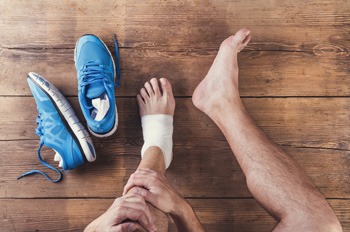 Exercising is an important part of maintaining your overall health, but can lead to various foot injuries if you are not careful. Common exercise-related foot injuries include Achilles tendonitis, plantar fasciitis, stress fractures, sprained ankles, pinched nerves, and heel spurs. Interestingly, exercises that target strengthening and stretching the feet can help reduce your risk of exercise-related foot injuries. Some exercises that can help prevent foot injuries include calf stretches and raises, toe lifts, and toe and heel walking. To learn more about preventing foot injuries, please consult with a podiatrist.
Exercising is an important part of maintaining your overall health, but can lead to various foot injuries if you are not careful. Common exercise-related foot injuries include Achilles tendonitis, plantar fasciitis, stress fractures, sprained ankles, pinched nerves, and heel spurs. Interestingly, exercises that target strengthening and stretching the feet can help reduce your risk of exercise-related foot injuries. Some exercises that can help prevent foot injuries include calf stretches and raises, toe lifts, and toe and heel walking. To learn more about preventing foot injuries, please consult with a podiatrist.
Sports related foot and ankle injuries require proper treatment before players can go back to their regular routines. For more information, contact Dr. Dean D. Hinners of Illinois. Our doctor can provide the care you need to keep you pain-free and on your feet.
Sports Related Foot and Ankle Injuries
Foot and ankle injuries are a common occurrence when it comes to athletes of any sport. While many athletes dismiss the initial aches and pains, the truth is that ignoring potential foot and ankle injuries can lead to serious problems. As athletes continue to place pressure and strain the area further, a mild injury can turn into something as serious as a rupture and may lead to a permanent disability. There are many factors that contribute to sports related foot and ankle injuries, which include failure to warm up properly, not providing support or wearing bad footwear. Common injuries and conditions athletes face, including:
- Plantar Fasciitis
- Plantar Fasciosis
- Achilles Tendinitis
- Achilles Tendon Rupture
- Ankle Sprains
Sports related injuries are commonly treated using the RICE method. This includes rest, applying ice to the injured area, compression and elevating the ankle. More serious sprains and injuries may require surgery, which could include arthroscopic and reconstructive surgery. Rehabilitation and therapy may also be required in order to get any recovering athlete to become fully functional again. Any unusual aches and pains an athlete sustains must be evaluated by a licensed, reputable medical professional.
If you have any questions please feel free to contact one of our offices located in Metropolis and Eldorado, IL . We offer the newest diagnostic and treatment technologies for all your foot and ankle needs.
Read more about Sports Related Foot And Ankle InjuriesWhy Do My Arches Hurt?
 Pain in the arches on the bottom of the feet is a common problem that can have many different causes. Plantar fasciitis, an inflammation of the plantar fascia, can lead to arch pain due to overstretching and pulling on this ligament from repetitive activities like running and jumping. Arch pain may also result from abnormalities in your gait or walking pattern. Arch pain may be especially prevalent in people whose feet overpronate or roll too much inwards when they walk. Walking, standing, or running for prolonged periods of time, being overweight, or having tight Achilles tendons or calf muscles are other risk factors for developing arch pain. If you have pain in your feet, it is recommended that you consult with a podiatrist.
Pain in the arches on the bottom of the feet is a common problem that can have many different causes. Plantar fasciitis, an inflammation of the plantar fascia, can lead to arch pain due to overstretching and pulling on this ligament from repetitive activities like running and jumping. Arch pain may also result from abnormalities in your gait or walking pattern. Arch pain may be especially prevalent in people whose feet overpronate or roll too much inwards when they walk. Walking, standing, or running for prolonged periods of time, being overweight, or having tight Achilles tendons or calf muscles are other risk factors for developing arch pain. If you have pain in your feet, it is recommended that you consult with a podiatrist.
Foot Pain
Foot pain can be extremely painful and debilitating. If you have a foot pain, consult with Dr. Dean D. Hinners from Illinois. Our doctor will assess your condition and provide you with quality foot and ankle treatment.
Causes
Foot pain is a very broad condition that could be caused by one or more ailments. The most common include:
- Bunions
- Hammertoes
- Plantar Fasciitis
- Bone Spurs
- Corns
- Tarsal Tunnel Syndrome
- Ingrown Toenails
- Arthritis (such as Gout, Rheumatoid, and Osteoarthritis)
- Flat Feet
- Injury (from stress fractures, broken toe, foot, ankle, Achilles tendon ruptures, and sprains)
- And more
Diagnosis
To figure out the cause of foot pain, podiatrists utilize several different methods. This can range from simple visual inspections and sensation tests to X-rays and MRI scans. Prior medical history, family medical history, and any recent physical traumatic events will all be taken into consideration for a proper diagnosis.
Treatment
Treatment depends upon the cause of the foot pain. Whether it is resting, staying off the foot, or having surgery; podiatrists have a number of treatment options available for foot pain.
If you have any questions, please feel free to contact one of our offices located in Metropolis and Eldorado, IL . We offer the newest diagnostic and treatment technologies for all your foot care needs.
Read more about Foot PainWhat Do Orthotics Help to Treat?
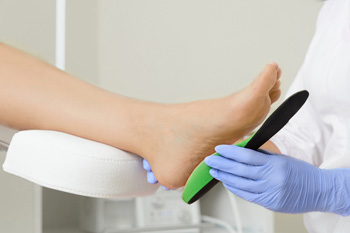 Orthotics are inserts that are put inside the shoe. They can be helpful in correcting certain foot conditions that may include abnormal foot structure and flat feet. Additionally, they can be beneficial in providing the necessary stability for deformities such as hammertoes. Orthotics are individually designed to properly fit your foot as the corrective process occurs. Research has shown they may be helpful in treating chronic foot ailments that can include plantar fasciitis, arthritis, or specific injuries that have happened. If you are interested in learning about orthotics and if they are right for you, it is strongly suggested that you confer with a podiatrist.
Orthotics are inserts that are put inside the shoe. They can be helpful in correcting certain foot conditions that may include abnormal foot structure and flat feet. Additionally, they can be beneficial in providing the necessary stability for deformities such as hammertoes. Orthotics are individually designed to properly fit your foot as the corrective process occurs. Research has shown they may be helpful in treating chronic foot ailments that can include plantar fasciitis, arthritis, or specific injuries that have happened. If you are interested in learning about orthotics and if they are right for you, it is strongly suggested that you confer with a podiatrist.
If you are having discomfort in your feet and would like to try orthotics, contact Dr. Dean D. Hinners from Illinois. Our doctor can provide the care you need to keep you pain-free and on your feet.
What Are Orthotics?
Orthotics are inserts you can place into your shoes to help with a variety of foot problems such as flat feet or foot pain. Orthotics provide relief and comfort for minor foot and heel pain but can’t correct serious biomechanical problems in your feet.
Over-the-Counter Inserts
Orthotics come in a wide variety of over-the-counter inserts that are used to treat foot pain, heel pain, and minor problems. For example, arch supports can be inserted into your shoes to help correct overarched or flat feet, while gel insoles are often used because they provide comfort and relief from foot and heel pain by alleviating pressure.
Prescription Orthotics
If over-the-counter inserts don’t work for you or if you have a more severe foot concern, it is possible to have your podiatrist prescribe custom orthotics. These high-quality inserts are designed to treat problems such as abnormal motion, plantar fasciitis, and severe forms of heel pain. They can even be used to help patients suffering from diabetes by treating foot ulcers and painful calluses and are usually molded to your feet individually, which allows them to provide full support and comfort.
If you are experiencing minor to severe foot or heel pain, it’s recommended to speak with your podiatrist about the possibilities of using orthotics. A podiatrist can determine which type of orthotic is right for you and allow you to take the first steps towards being pain-free.
If you have any questions please contact one of our offices located in Metropolis and Eldorado, IL . We offer the newest diagnostic and treatment technologies for all your foot and ankle needs.
Read more about Foot OrthoticsHow Bad Is My Ankle Sprain?
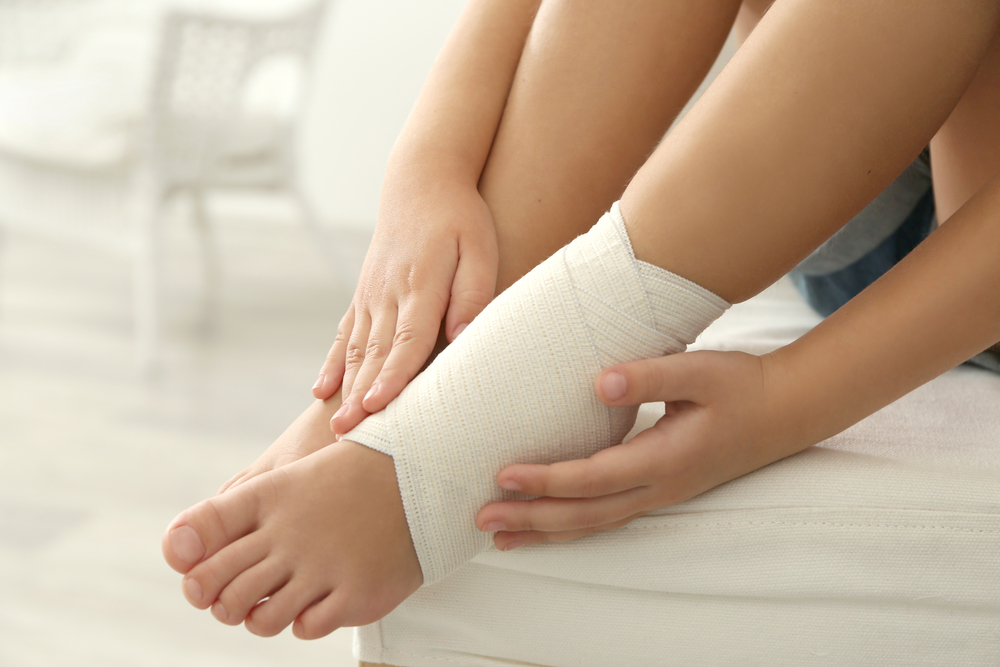 An ankle sprain is a common injury that occurs when one or more ligaments in the ankle are overstretched or torn. The severity of an ankle injury depends on the extent of damage to the affected ligaments. Ankle sprains are generally classified into three categories. A Grade 1 ankle sprain is mild and is characterized by stretching or microscopic tears in the ligaments, mild pain, slight swelling, and light bruising. A Grade 2 sprain is considered moderate and involves partial tearing of the ligament, abnormal looseness in the ankle joint, moderate pain, noticeable swelling, bruising, and joint instability when bearing weight on the ankle. A Grade 3 sprain is severe and occurs when the ligament tears completely. Symptoms include severe pain and bruising, significant swelling, and major joint instability. If you have sprained your ankle, it is recommended that you seek the care of a podiatrist.
An ankle sprain is a common injury that occurs when one or more ligaments in the ankle are overstretched or torn. The severity of an ankle injury depends on the extent of damage to the affected ligaments. Ankle sprains are generally classified into three categories. A Grade 1 ankle sprain is mild and is characterized by stretching or microscopic tears in the ligaments, mild pain, slight swelling, and light bruising. A Grade 2 sprain is considered moderate and involves partial tearing of the ligament, abnormal looseness in the ankle joint, moderate pain, noticeable swelling, bruising, and joint instability when bearing weight on the ankle. A Grade 3 sprain is severe and occurs when the ligament tears completely. Symptoms include severe pain and bruising, significant swelling, and major joint instability. If you have sprained your ankle, it is recommended that you seek the care of a podiatrist.
Ankle sprains are common but need immediate attention. If you need your feet checked, contact Dr. Dean D. Hinners from Illinois. Our doctor can provide the care you need to keep you pain-free and on your feet.
How Does an Ankle Sprain Occur?
Ankle sprains take place when the ligaments in your ankle are torn or stretched beyond their limits. There are multiple ways that the ankle can become injured, including twisting or rolling over onto your ankle, putting undue stress on it, or causing trauma to the ankle itself.
What Are the Symptoms?
- Mild to moderate bruising
- Limited mobility
- Swelling
- Discoloration of the skin (depending on severity)
Preventing a Sprain
- Wearing appropriate shoes for the occasion
- Stretching before exercises and sports
- Knowing your limits
Treatment of a Sprain
Treatment of a sprain depends on the severity. Many times, people are told to rest and remain off their feet completely, while others are given an air cast. If the sprain is very severe, surgery may be required.
If you have suffered an ankle sprain previously, you may want to consider additional support such as a brace and regular exercises to strengthen the ankle.
If you have any questions please feel free to contact one of our offices located in Metropolis and Eldorado, IL . We offer the newest diagnostic and treatment technologies for all your foot and ankle needs.
Read more about Ankle Sprains